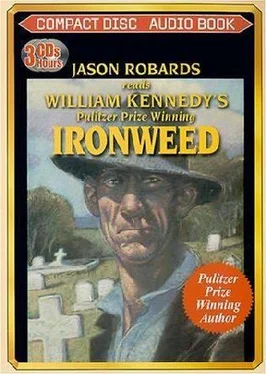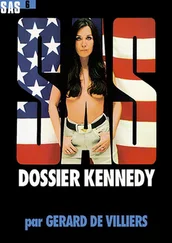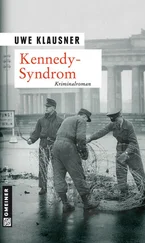William Kennedy - Ironweed
Здесь есть возможность читать онлайн «William Kennedy - Ironweed» весь текст электронной книги совершенно бесплатно (целиком полную версию без сокращений). В некоторых случаях можно слушать аудио, скачать через торрент в формате fb2 и присутствует краткое содержание. Жанр: Современная проза, на английском языке. Описание произведения, (предисловие) а так же отзывы посетителей доступны на портале библиотеки ЛибКат.
- Название:Ironweed
- Автор:
- Жанр:
- Год:неизвестен
- ISBN:нет данных
- Рейтинг книги:3 / 5. Голосов: 1
-
Избранное:Добавить в избранное
- Отзывы:
-
Ваша оценка:
- 60
- 1
- 2
- 3
- 4
- 5
Ironweed: краткое содержание, описание и аннотация
Предлагаем к чтению аннотацию, описание, краткое содержание или предисловие (зависит от того, что написал сам автор книги «Ironweed»). Если вы не нашли необходимую информацию о книге — напишите в комментариях, мы постараемся отыскать её.
Ironweed — читать онлайн бесплатно полную книгу (весь текст) целиком
Ниже представлен текст книги, разбитый по страницам. Система сохранения места последней прочитанной страницы, позволяет с удобством читать онлайн бесплатно книгу «Ironweed», без необходимости каждый раз заново искать на чём Вы остановились. Поставьте закладку, и сможете в любой момент перейти на страницу, на которой закончили чтение.
Интервал:
Закладка:
“You did somethin’, then,” Francis said. “Mentionin’ Newark was somethin’. Who’d you mention it to?”
“Bindy. But I didn’t know those guys were in Newark or I wouldn’t of said anything. I could never rat on anybody.”
“Then why’d you mention it?”
“I don’t know.”
“That’s how come you’re a magician.”
“That’s Martin’s baloney. But he turned somebody’s head around with it, ‘cause I’m back in good odor with the pols, is how he put it on the phone. In other words, I don’t stink to them no more.”
Francis smelled himself and knew he had to wash as soon as possible. The junk wagon’s stink and the bummy odor of his old suitcoat was unbearable now that he was among these people. Dirty butchers go out of business.
“You can’t go out now, Billy,” Annie said. “Not with your father home and staying for dinner. We’re going up in the attic to look at his things.”
“You like turkey?” Francis asked Billy.
“Who the hell don’t like turkey, not to give you a short answer,” Billy said. He looked at his father. “Listen, use my razor in the bathroom if you want to shave.”
“Don’t be telling people what to do,” Annie said. “Get dressed and come downstairs.”
And then Francis and Annie ascended the stairway to the attic.
o o o
When Francis opened the trunk lid the odor of lost time filled the attic air, a cloying reek of imprisoned flowers that unsettled the dust and fluttered the window shades. Francis felt drugged by the scent of the reconstituted past, and then stunned by his first look inside the trunk, for there, staring out from a photo, was his own face at age nineteen. The picture lay among rolled socks and a small American flag, a Washington Senators cap, a pile of news- paper clippings and other photos, all in a scatter on the trunk’s tray. Francis stared up at himself from the bleachers in Chadwick Park on a day in 1899, his face unlined, his teeth all there, his collar open, his hair unruly in the afternoon’s breeze. He lifted the picture for a closer look and saw himself among a group of men, tossing a baseball from bare right hand to gloved left hand. The flight of the ball had always made this photo mysterious to Francis, for the camera had caught the ball clutched in one hand and also in flight, arcing in a blur toward the glove. What the camera had caught was two instants in one: time separated and unified, the ball in two places at once, an eventuation as inexplicable as the Trinity itself. Francis now took the picture to be a Trinitarian talisman (a hand, a glove, a ball) for achieving the impossible: for he had always believed it impossible for him, ravaged man, failed human, to reenter history under this roof. Yet here he was in this acne of reconstitutable time, touching untouchable artifacts of a self that did not yet know it was ruined, just as the ball, in its inanimate ignorance, did not know yet that it was going nowhere, was caught.
But the ball is really not yet caught, except by the camera, which has frozen only its situation in space.
And Francis is not yet ruined, except as an apparency in process.
The ball still flies.
Francis still lives to play another day.
Doesn’t he?
The boy noticed the teeth. A man can get new teeth, store teeth. Annie got ‘em.
o o o
Francis lifted the tray out of the trunk, revealing the spikes and the glove, which Daniel immediately grabbed, plus two suits of clothes, a pair of black oxfords and brown high-button shoes, maybe a dozen shirts and two dozen white collars, a stack of undershirts and shorts, a set of keys to long-forgotten locks, a razor strop and a hone, a shaving mug with an inch of soap in it, a shaving brush with bristles,intact, seven straight razors in a case, each marked for a day of the week, socks, bow ties, suspenders, and a baseball, which Francis picked up and held out to Daniel.
“See that? See that name?”
The boy looked, shook his head. “I can’t read it.”
“Get it in the light, you’ll read it. That’s Ty Cobb. He signed that ball in 1911, the year he hit.420. A fella give it to me once and I always kept it. Mean guy, Cobb was, come in at me spikes up many a time. But you had to hand it to a man who played ball as good as he did. He was the best.”
“Better than Babe Ruth?”
“Better and tougher and meaner and faster. Couldn’t hit home runs like the Babe, but he did everything else better. You like to have that ball with his name on it?”
“Sure I would, sure! Yeah! Who wouldn’t?”
“Then it’s yours. But you better look him up, and Walter Johnson too. Find out for yourself how good they were. Still kickin’, too, what I hear about Cobb. He ain’t dead yet either.”
“I remember that suit,” Annie said, lifting the sleeve of a gray herringbone coat. “You wore it for dress-up.”
“Wonder if it’d still fit me,” Francis said, and stood up and held the pants to his waist and found out his legs had not grown any longer in the past twenty-two years.
“Take the suit downstairs,” Annie said. “I’ll sponge and press it.”
“Press it?” Francis said, and he chuckled. “S’pose I could use a new outfit. Get rid of these rags.”
He then singled out a full wardrobe, down to the handkerchief, and piled it all on the floor in front of the trunk.
“I’d like to look at these again,” Annie said, lifting out the clippings and photos.
“Bring ‘em down,” Francis said, closing the lid.
“I’ll carry the glove,” Daniel said.
“And I’d like to borry the use of your bathroom,” Francis said. “Take Billy up on that shave offer and try on some of these duds. I got me a shave last night but Billy thinks I oughta do it again.”
“Don’t pay any attention to Billy,” Annie said. “You look fine.”
She led him down the stairs and along a hallway where two rooms faced each other. She gestured at a bedroom where a single bed, a dresser, and a child’s rolltop desk stood in quiet harmony.
“That’s Danny’s room,” she said. “It’s a nice big room and it gets the morning light.” She took a towel down from a linen closet shelf and handed it to Francis. “Have a bath if you like.”
Francis locked the bathroom door and tried on the trousers, which fit if he didn’t button the top button. Wear the suspenders with ‘em. The coat was twenty years out of style and offended Francis’s residual sense of aptness. But he decided to wear it anyway, for its odor of time was infinitely superior to the stink of bumdom that infested the coat on his back. He stripped and let the bathwater run. He inspected the shirt he took from the trunk, but rejected it in favor of the white-on-white from the junk wagon. He tried the laceless black oxfords, all broken in, and found that even with calluses his feet had not grown in twentytwo years either.
He stepped into the bath and slid slowly beneath its vapors. He trembled with the heat, with astonishment that he was indeed here, as snug in this steaming tub as was the turkey in its roasting pan. He felt blessed. He stared at the bathroom sink, which now had an aura of sanctity about it, its faucets sacred, its drainpipe holy, and he wondered whether everything was blessed at some point in its existence, and he concluded yes. Sweat rolled down his forehead and dripped off his nose into the bath, a confluence of ancient and modern waters. And as it did, a great sunburst entered the darkening skies, a radiance so sudden that it seemed like a bolt of lightning; yet its brilliance remained, as if some angel of beatific lucidity were hovering outside the bathroom window. So enduring was the light, so intense beyond even sundown’s final gloryburst, that Francis raised himself up out of the tub and went to the window.
Читать дальшеИнтервал:
Закладка:
Похожие книги на «Ironweed»
Представляем Вашему вниманию похожие книги на «Ironweed» списком для выбора. Мы отобрали схожую по названию и смыслу литературу в надежде предоставить читателям больше вариантов отыскать новые, интересные, ещё непрочитанные произведения.
Обсуждение, отзывы о книге «Ironweed» и просто собственные мнения читателей. Оставьте ваши комментарии, напишите, что Вы думаете о произведении, его смысле или главных героях. Укажите что конкретно понравилось, а что нет, и почему Вы так считаете.












